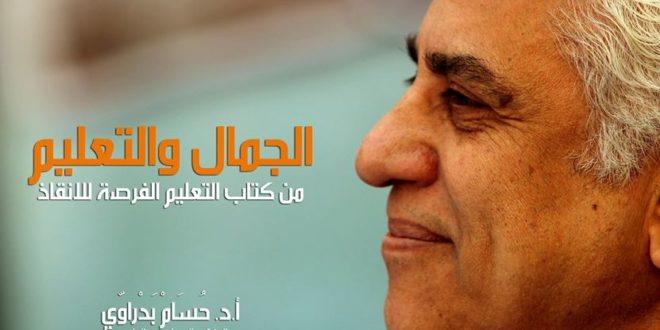By Dr. Hossam Badrawi on 05/05/2015
Al-Masry Al-Youm
Beauty is a distinctive feature of life manifested everywhere. It is a kind of order, harmony and consistency, with innumerable manifestations and appearances. The accuracy, tenderness, consistency, balance, coherence and the sense of happiness that beauty inspires in one’s self which man can or cannot express. This represents two different degrees of abilities: the ability to sense beauty, and the ability to express it. Sensing of external and internal beauty is a cognitive realization that can be learned. The other ability, which expresses, shows and describes beauty, is the ability of the artist, whether a photographer, writer, or otherwise, that has different artistic abilities. Since science and experiment have proved that there was a lot of knowledge and skills that humans can learn, especially in young age, and enables them to increase their general ability to express, every human is an artist to some degree. Uniqueness of art remains for the special talents that differentiate a person from another.
Pythagoras defined beauty as the essence of the mechanism of numerical symmetry that applies to the simplest and most complex phenomena. Abbas El-Aqqad defined beauty as the freedom of movement and the beauty of music. The existence beauty lies in ratios and mathematical relations. The beauty of the universe lies in the delicate harmony between the movement of planets and stars. Art in Islamic civilization expressed an aesthetic value derived from geometric shapes and colors, reflecting a new spirit and a philosophical mentality that has its own character. Beauty is a way to refine emotions, and it is a kind of freedom of conscience. Any intellectual who is wise in the development of education must define beauty as something that can be realized, within the interests of the school and educational institute, as our job is to build the abilities always as I said before. The recognition of beauty with all its psychological impact, that raises the level of humans, can have rules in the educational system which raises and prepares the youth of Egypt for the future.
Gentlemen, when the soul is torn apart, the work is separated from pleasure, passion and inspiration are missed, and the unity and harmony disintegrate, the need for beauty and realizing it becomes greater and more important. I do not mean the study of art for itself, but I take it to a wider aspect. I will take music as an example. Music is the most abstract art of practical purposes because its tool to influence human’s soul does not serve purposes beyond art. For example, it is not like architecture which is used in construction and useful to achieve purposes other than just causing aesthetic delight. Music, however, in its simple study, builds sense and knowledge of harmony and consistency. It reaches mathematics from the entrance of beauty and pleasure. Music practice skills are precision, proficiency, perseverance, commitment, individual uniqueness and teamwork. I do not look at music here as an abstract art, but rather as a basis for education. The same applies to the word, the means of literature, poetry, and other arts that may be used for purposes other than just creating beautiful artistic images.
My goal is that the philosophy of beauty with its external and internal realization is one of the goals of education, and to be the door to art in its various forms, integrated into our vision of human development within the educational institution. As Professor Zaki Naguib Mahmoud said, “If a normal person of the public knows in his current life how to distinguish between what is beautiful and what is ugly from the surrounding things, his knowledge makes him a better person who differentiates between good and evil. Good is always beautiful …”.
I say again that the nature of human, without the distortion we do to in family education or educational environment, is attracted to all that is beautiful. It was quoted by the Messenger of Allah, peace be upon him that «Allah is beautiful, He loves beauty». God Almighty makes beauty – in all its forms – a focus of satisfaction and happiness to humans. Appreciation of beauty is a common right for all, a man in it does not need to be a center or has power or money to enjoy it.
Beauty is not a negative value, but it originates from a creative force that motivates thinking and meditation, and opens the doors of faith and certainty. If it is allowed to enjoy beauty, it will be an entrance to the soul and taste elevation, and the ascension of soul and its salvation from decline and fall, and the motive of thought to go beyond the sensory manifestations. Beauty, in fact, is one of the causes of faith, one of its elements. The artistic aesthetic values carry on its wings what deepens and strengthens this faith and makes it a means of happiness and good in this life.
Moral philosophy, logics, and philosophy of beauty, with varying degrees of deepness, must be in the minds of young people, depending on the age at which they study in one way or another. The choice of the curricula of literature, poetry and arts of speech must be consistent with this vision. Merging such a methodology without hesitation to education is a part that should not be separated from the overall vision of development. However, I assure that the most important does not lie in the curriculum that is taught but in the teacher who understands this value, and a school and an institute that beauty philosophy is the leading principle to their content.
 Dr. Hossam Badrawi Official Website
Dr. Hossam Badrawi Official Website


